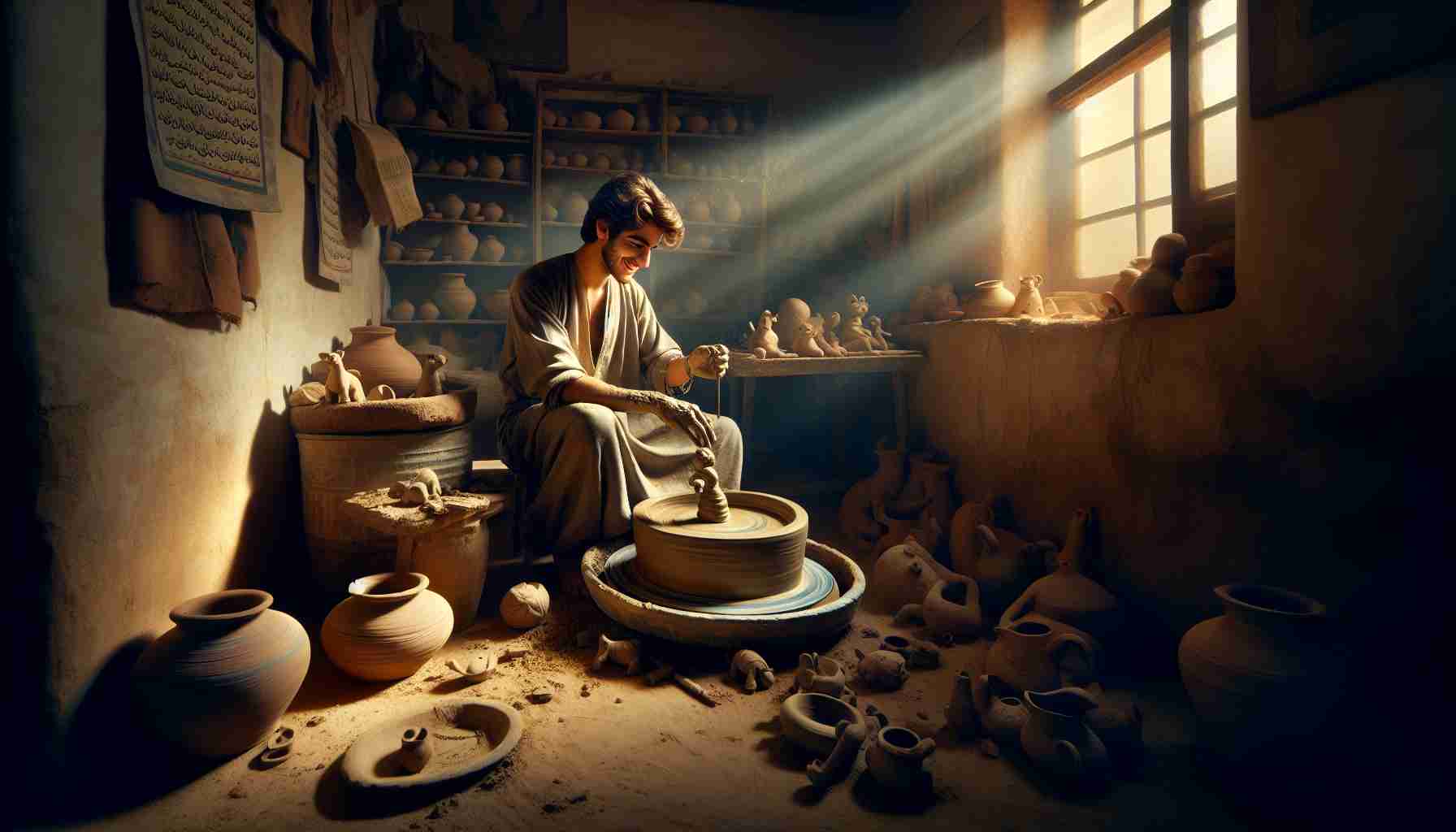

I was a potter’s son in the village of Mandana, nestled between dry hills and restless winds. My name is Chandan, and for many years, I shaped clay exactly as my father did, and his father before him. It was all I knew. Wake early, fetch water, knead earth, spin it into bowls and lamps. There was a comfort in the repetition, even though something in me longed for something else. But I buried that longing deep. Who was I to want more?
After my father's death, I tried to carry on his legacy. But the earth betrayed me — drought came. The clay cracked before it took shape. My pots collapsed under their own weight. And still, I clung to the wheel, as if spinning faster could bring him back. Each morning I offered a silent prayer to Vishnu — the preserver deity — to steady my hands, to steady my life. I told myself devotion was loyalty to the old ways.
But my heart grew heavy.
One afternoon, I wandered beyond our fields and sat under the pipal tree by the dry stream. A boy from the neighboring village came by, humming and tossing small pebbles. He sat beside me, unknowingly breaking my sorrow's silence.
“Why don’t you make clay toys like Ramesh Kaka does?” he asked, pointing to a dull-colored elephant in his pouch.
“Because that’s not what my father did,” I replied quickly.
He nodded like he understood, but said nothing more.
After he left, the silence returned. But it was softer, less sharp. I remembered a verse from the Bhagavad Gita that my mother once whispered during one of her pujas — sacred prayers. "Change is the law of the universe. What you think is death is only transformation." (Gita 2.27)
I hadn’t thought about that line in years.
I sat there long, till the heat cooled. In place of shame, a question began to rise: What if loyalty wasn’t to the old form, but to the deeper spirit behind it? What if dharma — my sacred duty — had shifted?
I went back to the wheel, but this time with children’s toys in mind — elephants, birds, tiny flutes. They were not perfect. But they brought laughter. The neighborhood kids came each morning, giggling, pointing, offering chai in exchange for an anklet-sized drum.
Later, I read in the Upanishads: "As a caterpillar comes to the end of one blade of grass and draws itself on to the next, so the Self, leaving the body, draws itself on to another." (Brihadaranyaka Upanishad 4.4.3)
I understood. Dharma doesn’t die; it moves. It takes a new form through us when the old one fades.
Even now, when I shape a small cow or dancer from the clay, I feel my father’s hands guiding mine. Not here to keep me tied — but steadying me as I step forward.
Each breath I take is a new chance. A new dharma. And that, I've learned, is sacred too.
I was a potter’s son in the village of Mandana, nestled between dry hills and restless winds. My name is Chandan, and for many years, I shaped clay exactly as my father did, and his father before him. It was all I knew. Wake early, fetch water, knead earth, spin it into bowls and lamps. There was a comfort in the repetition, even though something in me longed for something else. But I buried that longing deep. Who was I to want more?
After my father's death, I tried to carry on his legacy. But the earth betrayed me — drought came. The clay cracked before it took shape. My pots collapsed under their own weight. And still, I clung to the wheel, as if spinning faster could bring him back. Each morning I offered a silent prayer to Vishnu — the preserver deity — to steady my hands, to steady my life. I told myself devotion was loyalty to the old ways.
But my heart grew heavy.
One afternoon, I wandered beyond our fields and sat under the pipal tree by the dry stream. A boy from the neighboring village came by, humming and tossing small pebbles. He sat beside me, unknowingly breaking my sorrow's silence.
“Why don’t you make clay toys like Ramesh Kaka does?” he asked, pointing to a dull-colored elephant in his pouch.
“Because that’s not what my father did,” I replied quickly.
He nodded like he understood, but said nothing more.
After he left, the silence returned. But it was softer, less sharp. I remembered a verse from the Bhagavad Gita that my mother once whispered during one of her pujas — sacred prayers. "Change is the law of the universe. What you think is death is only transformation." (Gita 2.27)
I hadn’t thought about that line in years.
I sat there long, till the heat cooled. In place of shame, a question began to rise: What if loyalty wasn’t to the old form, but to the deeper spirit behind it? What if dharma — my sacred duty — had shifted?
I went back to the wheel, but this time with children’s toys in mind — elephants, birds, tiny flutes. They were not perfect. But they brought laughter. The neighborhood kids came each morning, giggling, pointing, offering chai in exchange for an anklet-sized drum.
Later, I read in the Upanishads: "As a caterpillar comes to the end of one blade of grass and draws itself on to the next, so the Self, leaving the body, draws itself on to another." (Brihadaranyaka Upanishad 4.4.3)
I understood. Dharma doesn’t die; it moves. It takes a new form through us when the old one fades.
Even now, when I shape a small cow or dancer from the clay, I feel my father’s hands guiding mine. Not here to keep me tied — but steadying me as I step forward.
Each breath I take is a new chance. A new dharma. And that, I've learned, is sacred too.